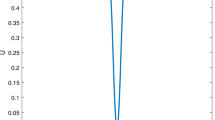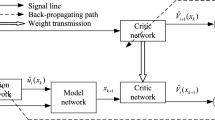Abstract
In this paper, a novel frame work of reinforcement learning for continuous time dynamical system is presented based on the Hamiltonian functional and extreme learning machine. The idea of solution search in the optimization is introduced to find the optimal control policy in the optimal control problem. The optimal control search consists of three steps: evaluation, comparison and improvement of arbitrary admissible policy. The Hamiltonian functional plays an important role in the above framework, under which only one critic is required in the adaptive critic structure. The critic network is implemented by the extreme learning machine. Finally, simulation study is conducted to verify the effectiveness of the presented algorithm.
Access this chapter
Tax calculation will be finalised at checkout
Purchases are for personal use only
Similar content being viewed by others
References
Abu-Khalaf, M., Lewis, F.L.: Nearly optimal control laws for nonlinear systems with saturating actuators using a neural network HJB approach. Automatica 41(5), 779–791 (2005)
Beard, R.W., Saridis, G.N., Wen, J.T.: Galerkin approximations of the generalized Hamilton-Jacobi-Bellman equation. Automatica 33(12), 2159–2177 (1997)
Bertsekas, D.P.: Dynamic Programming and Optimal Control. Athena Scientific, Belmont (1995)
Huang, G.B., Zhu, Q.Y., Siew, C.K.: Extreme learning machine: theory and applications. Neurocomputing 70(1), 489–501 (2006)
Jiang, Y., Jiang, Z.P.: Computational adaptive optimal control for continuous-time linear systems with completely unknown dynamics. Automatica 48(10), 2699–2704 (2012)
Kleinman, D.: On an iterative technique for Riccati equation computations. IEEE Trans. Autom. Control 13(1), 114–115 (1968)
Lewis, F.L., Syrmos, V.L.: Optimal Control. Wiley, New York (1995)
Liu, D., Wei, Q.: Policy iteration adaptive dynamic programming algorithm for discrete-time nonlinear systems. IEEE Trans. Neural Netw. Learn. Syst. 25(3), 621–634 (2014)
Modares, H., Lewis, F.L., Jiang, Z.P.: H\(_\infty \) tracking control of completely unknown continuous-time systems via off-policy reinforcement learning. IEEE Trans. Neural Netw. Learn. Syst. 26(10), 2550–2562 (2015)
Prokhorov, D.V., Wunsch, D.C.: Adaptive critic designs. IEEE Trans. Neural Netw. 8(5), 997–1007 (1997)
Saridis, G.N., Lee, C.G.: An approximation theory of optimal control for trainable manipulators. IEEE Trans. Syst. Man Cybern. 9(3), 152–159 (1979)
Song, R., Xiao, W., Zhang, H., Sun, C.: Adaptive dynamic programming for a class of complex-valued nonlinear systems. IEEE Trans. Neural Netw. Learn. Syst. 25(9), 1733–1739 (2014)
Vamvoudakis, K.G., Lewis, F.L.: Online actor-critic algorithm to solve the continuous-time infinite horizon optimal control problem. Automatica 46(5), 878–888 (2010)
Wang, F.Y., Zhang, H., Liu, D.: Adaptive dynamic programming: an introduction. IEEE Comput. Intell. Mag. 4(2), 39–47 (2009)
Wei, Q., Wang, F.Y., Liu, D., Yang, X.: Finite-approximation-error-based discrete-time iterative adaptive dynamic programming. IEEE Trans. Cybern. 44(12), 2820–2833 (2014)
Yang, Y., Wunsch, D., Yin, Y.: Hamiltonian-driven adaptive dynamic programming for continuous nonlinear dynamical systems. IEEE Trans. Neural Netw. Learn. Syst. (2017, to be published)
Zhang, H., Qin, C., Jiang, B., Luo, Y.: Online adaptive policy learning algorithm for H\(_\infty \) state feedback control of unknown affine nonlinear discrete-time systems. IEEE Trans. Cybern. 44(12), 2706–2718 (2014)
Acknowledgments
This work was supported in part by the Mary K. Finley Missouri Endowment, the Missouri S&T Intelligent Systems Center, the National Science Foundation, the National Natural Science Foundation of China (NSFC Grant No. 61333002) and the China Scholarship Council (CSC No. 201406460057).
Author information
Authors and Affiliations
Corresponding author
Editor information
Editors and Affiliations
Rights and permissions
Copyright information
© 2017 Springer International Publishing AG
About this paper
Cite this paper
Yang, Y., Wunsch, D., Guo, Z., Yin, Y. (2017). Hamiltonian-Driven Adaptive Dynamic Programming Based on Extreme Learning Machine. In: Cong, F., Leung, A., Wei, Q. (eds) Advances in Neural Networks - ISNN 2017. ISNN 2017. Lecture Notes in Computer Science(), vol 10261. Springer, Cham. https://doi.org/10.1007/978-3-319-59072-1_24
Download citation
DOI: https://doi.org/10.1007/978-3-319-59072-1_24
Published:
Publisher Name: Springer, Cham
Print ISBN: 978-3-319-59071-4
Online ISBN: 978-3-319-59072-1
eBook Packages: Computer ScienceComputer Science (R0)




